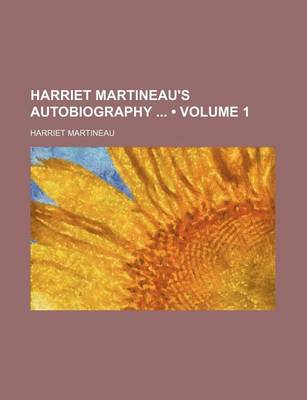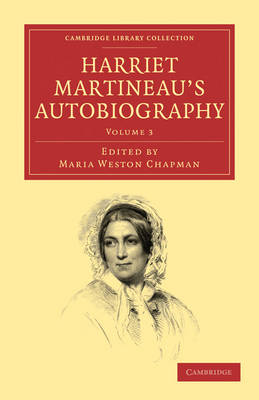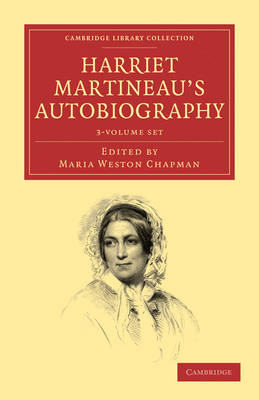Cambridge Library Collection - British and Irish History, 19th Century
3 primary works • 6 total works
Volume 1
Harriet Martineau (1802-1876) was a British writer who was one of the first social theorists to examine all aspects of a society, including class, religion, national character and the status of women. These volumes, first published in 1877, contain Martineau's unusual autobiography. Written in three months in 1855 when she believed herself to be dying of heart disease, the original two volumes remained unaltered despite her recovery and continued writing. The third volume, covering the remainder of Martineau's life, was written by her friend and literary executor, Maria Chapman, who had access to Martineau's private papers. These works were the first substantial published account of Martineau's life and work, and remain a remarkable example of the genre for Martineau's vivid descriptions and candid, outspoken opinions of Victorian society. Volume 1 covers her life until 1834. For more information on this author, see http://orlando.cambridge.org/public/svPeople?person_id=martha
Volume 2
Harriet Martineau's Autobiography: Volume 2
by Harriet Martineau and Maria Weston Chapman
Published 13 March 2010
Harriet Martineau (1802-1876) was a British writer who was one of the first social theorists to examine all aspects of a society, including class, religion, national character and the status of women. These volumes, first published in 1877, contain Martineau's unusual autobiography. Written in three months in 1855 when she believed herself to be dying, the original two volumes remained unaltered despite her recovery and continued writing. The third volume, covering the remainder of Martineau's life, was written by her friend and literary executor, Maria Chapman, who had access to Martineau's private papers. These works were the first substantial published account of Martineau's life and work, and remain a remarkable example of the genre for Martineau's vivid descriptions and candid, outspoken opinions of Victorian society. Volume 2 covers her life from 1834 to 1855. For more information on this author, see http://orlando.cambridge.org/public/svPeople?person_id=martha
Volume 3
Harriet Martineau's Autobiography
by Harriet Martineau and Maria Weston Chapman
Published 3 October 2009
Harriet Martineau (1802–1876) was a British writer who was one of the first social theorists to examine all aspects of a society, including class, religion, national character and the status of women. These volumes, first published in 1877, contain Martineau's unusual autobiography. Written in three months in 1855 when she believed herself to be dying, the original two volumes remained unaltered despite her recovery and continued writing. The third volume, covering the remainder of Martineau's life, was written by her friend and literary executor, Maria Chapman, who had access to Martineau's private papers. These works were the first substantial published account of Martineau's life and work, and remain a remarkable example of the genre for Martineau's vivid descriptions and candid, outspoken opinions of Victorian society. Volume 3 contains Chapman's biography of Martineau. For more information on this author, see http://orlando.cambridge.org/public/svPeople?person_id=martha
In the preface to this 1859 book Harriet Martineau (1802–1876) tells the reader that this 'is not a work of invention' or a 'fancy-piece' and thereby sets the tone for a study that is partly historical and partly sociological. In the writing of the book, Martineau collaborated with another prominent nineteenth-century figure, Florence Nightingale. They wished to gain political support for improvements in military hygiene and health care. Martineau draws on Nightingale's experiences when nursing wounded soldiers during the Crimean War and builds it into a strong narrative that describes the conditions that soldiers experienced in the barracks, in hospitals and on the field, making practical recommendations as to how to improve these areas, by legislation if necessary, so as to ensure the future good health of Britain's armed forces. For more information on this author, see http://orlando.cambridge.org/public/svPeople?person_id=martha
Harriet Martineau's Autobiography 3 Volume Set
by Harriet Martineau and Maria Weston Chapman
Published 18 November 2010
Harriet Martineau (1802-1876) was a British writer who was one of the first social theorists to examine all aspects of a society, including class, religion, national character and the status of women. These volumes, first published in 1877, contain Martineau's unusual autobiography. Written in three months in 1855 when Martineau believed herself to be dying of heart disease, the original two volumes remained unaltered despite her recovery. The third volume, covering the remainder of Martineau's life, was written by friend literary executor Maria Western Chapman, using her first-hand knowledge and access to Martineau's private papers. These volumes were the first substantial published account of Martineau's life and work, and remain a remarkable example of the genre for Martineau's vivd descriptions and candid, outspoken opinions of Victorian society. For more information on this author, see http://orlando.cambridge.org/public/svPeople?person_id=martha
Harriet Martineau (1802-1876) was a British writer who was one of the first social theorists to examine all aspects of a society, including class, religion, national character and the status of women. These volumes, first published in 1877, contain Martineau's unusual autobiography. Written in three months in 1855 when she believed herself to be dying, the original two volumes remained unaltered despite her recovery and continued writing. The third volume, covering the remainder of Martineau's life, was written by her friend and literary executor, Maria Chapman, who had access to Martineau's private papers. These works were the first substantial published account of Martineau's life and work, and remain a remarkable example of the genre for Martineau's vivid descriptions and candid, outspoken opinions of Victorian society. Volume 3 contains Chapman's biography of Martineau. For more information on this author, see http://orlando.cambridge.org/public/svPeople?person_id=martha




